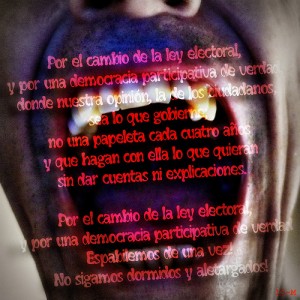
It is a voice of alarm that brings together the feelings of several generations, nationalities, political colors and economic classes. It is probable that we are witnessing in these gatherings an exercise in real and participatory democracy. Others, however, consider that the protestors are living in a utopia outside of the reality imposed by the market economy. Nonetheless, there are some who foresee a new phase in Spanish democracy. For that reason, the protests that took place on Sunday, June 19 are a breath of fresh air in a society threatened by the economic crisis, unemployment and the indifference of the justice system to cases of corruption in certain political circles.
Putting to one side political considerations and the criticisms of those who minimize the importance of the 15-M movement, one reality stands out: Spanish society has displayed its discontent publicly. On the other hand, although some of the “malcontents” in the protests questioned the public powers, the democratic system that exists, despite its weaknesses, has made possible this public space for debate. The question now is: are Spanish politicians up to the task of meeting the demands of the society they represent?
The votes cast in the local elections on May 22 reflected the need for a change in the political and economic course of the country. The general election, due next year, is drawing closer and the debate about the “malcontents” is starting to gain a prominent place in political discourse. But this is precisely one of the problems that could affect the movement: the political use of 15-M. How can the movement avoid falling into the trap of becoming precisely the thing they are questioning?
The public meetings organized by members of the movement in towns and city districts across the country are valid settings in which to evaluate the movement and maintain the latent social network. However, the opinions expressed therein should be turned into concrete and well-defined proposals; in discourse and meetings with political parties; in subsystems that influence the public powers to obtain the desired results in a society that hopes for significant changes within the democratic framework.
The protestors are caught between being a fashionable tool that could be used for political goals or being a real movement for citizen participation in a plural and democratic society.
This article has been translated from Spanish with the author’s permission. Read the original Spanish version here.
Este artículo ha sido traducido del español con el permiso del autor. Lea el original aquí.
Leave a Reply
You must be logged in to post a comment.